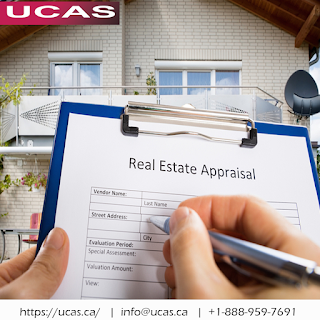How is Industrial Property Appraisal conducted
How is Industrial Property Appraisal
conducted
You
can be anywhere in the world, but if you need an Industrial Appraisal in Montreal, UCAS’s team of fully
accredited appraisers will do it for you; while offering you a range of
suitable consultancy options.
Entrust our team with your appraisal directives for your property. Approved appraisal of residential, commercial, institutional, agricultural property, etc. Inquire now for a free consultation & quotation.
Visit at https://ucas.ca/ | https://ucas.ca/fr/ or call at +1-888-959-7691
Besides buying-selling
deals the reasons for determining the value of any Industrial Property can be
many.
Property Valuers have a choice of five basic methods for conducting
an industrial property evaluation, and the choice is governed by the category
of the property in question. In an analysis situation, more than one method may
be resorted to.
The Comparison Approach: Usually the most popular one, because it is directly linked to current
market transactions. It works well when the market is stable (or the trend is
stable) and there is ample data – many recent sales of comparable properties.
With less such instances, adjustments are made based on similar sales in other
comparable areas or regions.
UCAS who
conduct Industrial Appraisal Toronto (Montreal
& Ottawa as well) have a most
extensive data base and so are best positioned for such evaluation.
The Comparison method is generally
suitable for offices, warehouses, depots and storage/distribution facilities
such as refrigerated/cold storage.
The Profits Approach: It is used when comparable rental/sale data is simply not there, typically
in monopolistic business property, such as canteens and eating places,
hospitals. It is based on estimates of a business’s gross profits.
The Residual Approach: Used to value property with
development potential or vacant land that could be developed for use. Mostly
based on projections it can come up with wide-ranging valuations depending on
who is doing the guesstimating.
The (Contractor’s) or Cost Valuation Approach: Often used for a property that is unique and
without comparable market transactions. The cost for each element of the
property (such as land, building, roads and infrastructure) is calculated based
on what it would be for a fresh equivalent and then totaled for arriving at a
valuation. Land costing can be difficult with wide variances and so it is usually
a last resort. Realistic market value is driven by forces of supply and demand,
not by the cost of construction.
The Investment Approach: Based on the potential of the property to generate future income. As an
example: A company in dire need of a manufacturing facility could use the
transfer prices of the products it intends to make here to make projections for
the future and thus arrive at a price ceiling for the what may be its bid for
the property. There are many versions of this that are based on Discounted Cash
Flow and Net Present Value (NPV) modeling.
Entrust our team with your appraisal directives for your property. Approved appraisal of residential, commercial, institutional, agricultural property, etc. Inquire now for a free consultation & quotation.
Visit at https://ucas.ca/ | https://ucas.ca/fr/ or call at +1-888-959-7691




Comments
Post a Comment